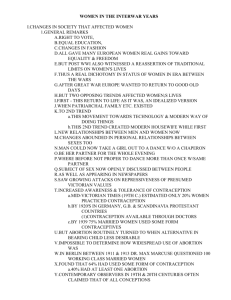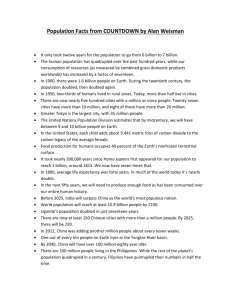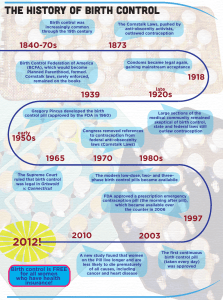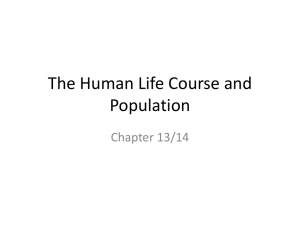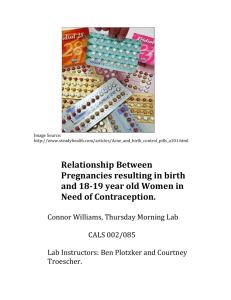1 Making Birth Control Acceptable in France A new reading of the
advertisement
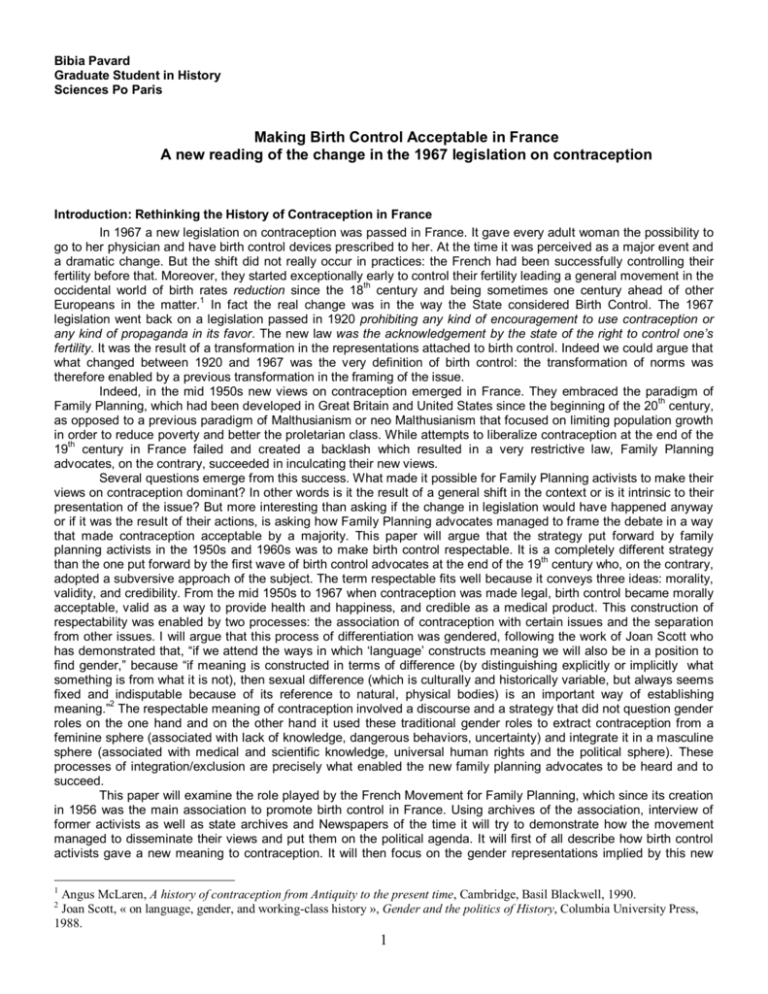
Bibia Pavard Graduate Student in History Sciences Po Paris Making Birth Control Acceptable in France A new reading of the change in the 1967 legislation on contraception Introduction: Rethinking the History of Contraception in France In 1967 a new legislation on contraception was passed in France. It gave every adult woman the possibility to go to her physician and have birth control devices prescribed to her. At the time it was perceived as a major event and a dramatic change. But the shift did not really occur in practices: the French had been successfully controlling their fertility before that. Moreover, they started exceptionally early to control their fertility leading a general movement in the occidental world of birth rates reduction since the 18th century and being sometimes one century ahead of other Europeans in the matter.1 In fact the real change was in the way the State considered Birth Control. The 1967 legislation went back on a legislation passed in 1920 prohibiting any kind of encouragement to use contraception or any kind of propaganda in its favor. The new law was the acknowledgement by the state of the right to control one’s fertility. It was the result of a transformation in the representations attached to birth control. Indeed we could argue that what changed between 1920 and 1967 was the very definition of birth control: the transformation of norms was therefore enabled by a previous transformation in the framing of the issue. Indeed, in the mid 1950s new views on contraception emerged in France. They embraced the paradigm of Family Planning, which had been developed in Great Britain and United States since the beginning of the 20th century, as opposed to a previous paradigm of Malthusianism or neo Malthusianism that focused on limiting population growth in order to reduce poverty and better the proletarian class. While attempts to liberalize contraception at the end of the 19th century in France failed and created a backlash which resulted in a very restrictive law, Family Planning advocates, on the contrary, succeeded in inculcating their new views. Several questions emerge from this success. What made it possible for Family Planning activists to make their views on contraception dominant? In other words is it the result of a general shift in the context or is it intrinsic to their presentation of the issue? But more interesting than asking if the change in legislation would have happened anyway or if it was the result of their actions, is asking how Family Planning advocates managed to frame the debate in a way that made contraception acceptable by a majority. This paper will argue that the strategy put forward by family planning activists in the 1950s and 1960s was to make birth control respectable. It is a completely different strategy than the one put forward by the first wave of birth control advocates at the end of the 19th century who, on the contrary, adopted a subversive approach of the subject. The term respectable fits well because it conveys three ideas: morality, validity, and credibility. From the mid 1950s to 1967 when contraception was made legal, birth control became morally acceptable, valid as a way to provide health and happiness, and credible as a medical product. This construction of respectability was enabled by two processes: the association of contraception with certain issues and the separation from other issues. I will argue that this process of differentiation was gendered, following the work of Joan Scott who has demonstrated that, “if we attend the ways in which ‘language’ constructs meaning we will also be in a position to find gender,” because “if meaning is constructed in terms of difference (by distinguishing explicitly or implicitly what something is from what it is not), then sexual difference (which is culturally and historically variable, but always seems fixed and indisputable because of its reference to natural, physical bodies) is an important way of establishing meaning.”2 The respectable meaning of contraception involved a discourse and a strategy that did not question gender roles on the one hand and on the other hand it used these traditional gender roles to extract contraception from a feminine sphere (associated with lack of knowledge, dangerous behaviors, uncertainty) and integrate it in a masculine sphere (associated with medical and scientific knowledge, universal human rights and the political sphere). These processes of integration/exclusion are precisely what enabled the new family planning advocates to be heard and to succeed. This paper will examine the role played by the French Movement for Family Planning, which since its creation in 1956 was the main association to promote birth control in France. Using archives of the association, interview of former activists as well as state archives and Newspapers of the time it will try to demonstrate how the movement managed to disseminate their views and put them on the political agenda. It will first of all describe how birth control activists gave a new meaning to contraception. It will then focus on the gender representations implied by this new 1 Angus McLaren, A history of contraception from Antiquity to the present time, Cambridge, Basil Blackwell, 1990. Joan Scott, « on language, gender, and working-class history », Gender and the politics of History, Columbia University Press, 1988. 2 1 reading of contraception. It will finally study how the new meaning given to contraception and its gender implications as well as concrete kinships managed to convince people in power to change the legislation. 1. Making Birth Control acceptable A. The repressive context of the 1950s Contraception in post-war France was not a debated issue for two main reasons. First of all, because of the legal obstacle: the repressive legislation on contraception and abortion prohibited any advertisement or propaganda on both. This aspect of the law was directly aimed at birth control activists. This prevented any form of information on birth control to circulate freely and prevented any form of debate, whether political or scientific. Second, there was the demographic context. France experienced a baby boom at the end of World War II, and the dominant image of the French family was a couple with a lot of babies. B. Gathering honorable mothers: legitimizing action Family Planning activists reopened the debate on birth control by leaving the figure of the mother inside the married couple unquestioned. It is rather paradoxical: the idea was to promote birth control without jeopardizing the image of the good mother and wife. The choice of the name for the association that a few women created in 1956 is very significant. They decide to call it “Happy Motherhood” 3 Evelyne Sullerot, one of the founders of the association, looking back at that time, explains that they consciously aimed at respectability in the creation of the association the first members of the association were all of a higher social status – most were in majority wives of important men: doctors, politicians, administrators- and the were all mothers.4 C. Reconciling democratic ideals and birth control Moreover, the founders of “Happy Motherhood” rephrased the debate in terms of injustice. What seems ultimately intolerable to them is that married women and good mothers could not master their own lives, and even worse, they could be put in a position to risk their lives by having to undergo too many pregnancies. They felt less free than their husbands and this situation contradicted their democratic ideals. They managed to make contraception an unthreatening issue by relocating it in another type of debate involving justice, human rights and dignity. Their second move is to give a positive definition to the concept of “family planning” previously unknown to the French public. To do that they presented it as a serious, scientifically valid approach to contraception. 2. Making Birth Control respectable A. Distinguishing Malthusianism and Family Planning From the beginning of their struggle, Family Planning activists put a great deal of energy distinguishing their action from the one of the “neo Malthusians” who promoted birth control from the end of 19th century until the th beginning of the 20 century. Family Planning Advocates used two main arguments: their struggle was not a leftist one; it was not aimed at limiting the global population of the country but at enabling individuals at choosing when to have children. B. Medicalizing Birth Control Two main arguments were used to promote birth control: it would make parents and children happier but before anything else it would be a weapon against backstreet abortion. Abortion was illegal at the time in France but a great deal of women used it as a last resort contraceptive. Therefore abortions were taking place in a non medical realm which could lead to serious or even lethal accidents. This discourse created an alternative between contraception associated with health, happiness, and respectability while abortions were associated with danger and despair and criminality. The new Family Planning advocates also expressed their rejection of the folk techniques of contraception as inefficient. It was rather paradoxical since it worked for generations but by doing that they aimed at making birth control a scientific matter and associated their struggle with the emergence of new contraceptive techniques especially the pill and the intra uterine device. 3 4 The association “Happy Motherhood” changed its name in “French Family Planning Association” in 1961 Interview with Evelye Sullerot, 02-23-2006. 2 C. Establishing contraception experts From its very creation “Happy Motherhood” defined its action as a scientific one. The first article of the bylaws of the association described its goals as “the study of the problems of motherhood, birth, of their familial, social and national repercussions” and “the research of scientific information in France and abroad concerning these problems.” 5 The scientific goals were twofold using tools developed by social sciences to study the question of birth control on the one hand and using hard science research on contraceptive techniques on the other. But as soon as the beginning of the 1960s the medical expertise became preeminent and corresponded to a change in the composition of the association which changed its name from “Happy Motherhood” to The French Family Planning Movement and which was no longer composed of mothers but of men and women, the men being preeminently physicians. The physicians of the association became the public experts of contraception by being the only ones who talked or published on the matter. They could not be ignored by the politicians when the issue became a political one, therefore they played an important role in the preparation of the new law. 3. Making Birth Control political A. Reframing contraception as a general interest It was not obvious that contraception was a political matter. On the contrary it was considered as a private one. An in the private sphere it was considered as a woman question. Abortion had been political for more than a century but contraception was never an issue. Family Control advocates, however, associated it with broader issues such as social inequalities and poverty or fight against religious power. Therefore they managed to make it an interesting issue not only for women or physicians but for every citizen. B. Seducing female voters Paradoxically while contraception became a general interest it also became partisan: the reformers saw it as a way to modernize French society. It became a way to oppose both the government and to distinguish oneself from communists who promoted, in the east, abortion rather than contraception. Politicians got involved in order to seduce female voter, especially leftwing parties that turned out to be less attractive to women since they were granted the vote in 1945. When in 1965, the French elected their president at the universal suffrage for the first time, the socialist candidate declared himself in favor of a legislative change on contraception and forced all the candidates to take position. Even if De Gaulle did not take position he could no longer ignore the issue, for political and electoral reasons. C. Using networks Family Planning activists were very successful at using various networks in order to convince people in power. Some of them were political parties members or free masons and used preexisting connections to disseminate their ideas. They also were supported by journalists, intellectual and artists who echoed their demands. More over the mass media played a major in the popularization of the issue. Family Planning advocates constantly aimed at people in power on the one hand and global French population on the other hand, a strategy that a former activist defined as a “stereo tactic”. It also enabled a majority of French in polls to be in favor of a legislative change on contraception. Conclusion : birth control after 1967, from respectability to subversion In 1967, the legislation liberalizing contraception was passed, keeping the frames of understanding birth control developed by the “French Family Planning Movement”. The law defined contraception as a way to prevent abortions; the distribution of contraceptives was controlled by physicians and pharmacists and not directly offered to couples because contraception became associated with the new contraceptives devices which indeed were medical; underage people could not buy contraceptive devices (to ensure the morality of the law) and people who bought contraceptive devices were kept track of by a system of registration. Moreover some legal obstructions prevented the law from being efficient right away. Therefore, even though it was an important symbolic turning point because contraception was no longer forbidden by the law, it was not yet concretely easily accessible. The liberalization was strongly associated with control and corresponded to the way contraception was framed by Family Planning advocates since the mid fifties in order to succeed. 5 In D’une révolte à une lutte. Vingt-cinq ans d’histoire du planning familial, Paris, Mouvement Français pour le Planning Familial, éditions Tierce, 1982, p.84. 3 It was in fact just after the law was passed that the political debate changed completely in France. The 1968 movement transformed the framing of many issues, including birth control. As soon as 1969 the debate reemerged around abortion and it became much more controversial. By 1970 the Women’s Liberation Movement had made it a central political struggle. At that point the strategy was no longer respectability but subversion as a revolutionary means. Breaking the law and having illegal abortions was used as a way to denounce the restrictive law. In so doing that a new generation of activists striped birth control’s respectability and redefined it as freedom, control over one’s body, and women’s liberation. This new framing of the issue resulted in the liberalization of abortion by the 1975 law, a liberalization that was not at all forecasted by the 1967 law on contraception. The example of the legislation on contraception in France is a way to reexplore the history of legislative change. It is often presented as whether a choice from the government whether the result of a social movement but this example shows that there are a complete panel of situations in between that associate civil society and the state. The success of the family planning movement in France was implemented by its ability to be a link between civil society and political actors and by playing on all grounds simultaneously. Moreover in enables to point out the crucial role of the framing of an issue on the final result of a legal text. 4

